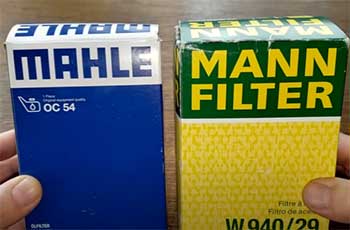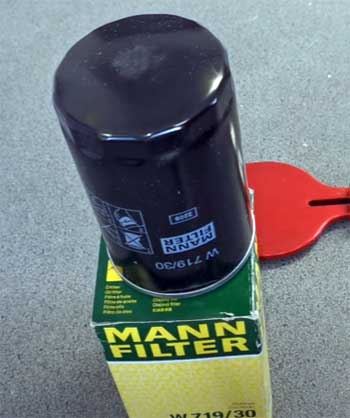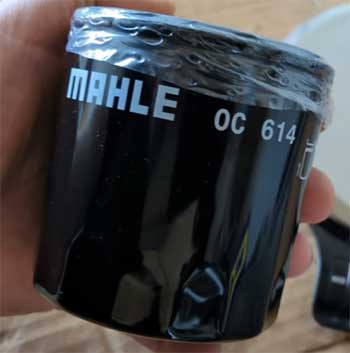I’m no stranger to wrenching on my car, and picking the right oil filter is a choice I take seriously. MANN and MAHLE are two heavyweights in the automotive world, and I’ve used both over the years.
In this article, I’ll break down their pros and cons, share my experiences, and help you decide which one suits your ride.
Whether you’re a DIY enthusiast or just curious, I’m here to make sense of these filters with a clear, no-nonsense comparison. Let’s get started and figure out what makes each brand tick.
A Brief Comparison Table
| Feature | MANN Filters | MAHLE Filters |
| OEM Status | OEM for BMW, Mercedes, VW, others | OEM for BMW, Audi, Porsche, others |
| Construction | Plastic end caps, ribbed plastic core | Metal end caps, perforated metal core |
| Pleat Count | Typically 60-65 pleats | Typically 68-74 pleats |
| Filtration Media | Cellulose or synthetic blend | Cellulose or synthetic blend |
| Price Range | $6-$16 | $8-$18 |
| Country of Origin | Germany, Mexico, USA | Germany, Austria, India |
| Warranty | Varies by retailer | Varies by retailer |
| Availability | Widely available | Widely available |
| Eco-Friendly | Some biodegradable options | Standard construction |
My Journey With Oil Filters

I’ve been changing my own oil since I got my first car—a beat-up BMW E46 that taught me more about maintenance than any manual could.
Back then, I didn’t think much about oil filters. I’d grab whatever was cheapest at the auto parts store and call it a day.
But after a few thousand miles and some research, I realized the filter matters just as much as the oil.
That’s when I started paying attention to brands like MANN and MAHLE.
Both brands have a reputation for quality, especially for European cars like my BMW and the Audi I picked up later. I’ve used MANN filters on my E46 for years and switched to MAHLE when I got the Audi.
Each has its quirks, and I’ve learned what works best through trial and error. Let me walk you through what I’ve found, starting with what makes these brands stand out.
MANN Filters: The Reliable Workhorse
MANN has been around forever, and for good reason. They’re a go-to for German carmakers like BMW, Mercedes, and Volkswagen. I remember popping open the hood of my E46 and finding a MANN filter already installed from the factory. That kind of OEM trust says something.
- Pros of MANN Filters
First off, MANN filters are everywhere. Walk into any auto parts store, and you’ll likely find them on the shelf. I’ve never had trouble sourcing one, whether I’m at a local shop or ordering online.

Price is another win—most MANN filters run between $6 and $16, depending on the model.
For my BMW, I usually pay around $8, which feels like a steal for the quality.
The construction is solid, too. MANN uses a ribbed plastic core, which I’ve found holds up well under high oil pressure.
I cut open a used one once (yeah, I’m that guy), and the filter media looked intact, with no tears or clogs after 7,500 miles.
They also offer some eco-friendly options, like their “Evotop” line, which claims to be biodegradable.
I haven’t tested those extensively, but it’s a nice touch if you’re into greener choices.
Another thing I like is MANN’s consistency.
They’ve been making filters since the 1940s, and their experience shows. I’ve never had one fail on me—no leaks, no weird noises, just smooth performance.
For my E46, MANN’s HU926/4x was a perfect fit, sliding right into the canister without any fuss.
- Cons of MANN Filters
But MANN isn’t flawless. One thing that bugs me is their country of origin. Some filters are made in Germany, which feels reassuring, but others come from Mexico or the USA.
I got a Mexican-made one once, and the build quality seemed a bit off—sloppy seams and fewer pleats (around 63 compared to MAHLE’s 70). It still worked fine, but I couldn’t shake the feeling it wasn’t as robust.
Speaking of pleats, MANN tends to skimp here. Fewer pleats mean less filtering surface area, which could affect efficiency over long oil change intervals. For my BMW, I change oil every 7,500 miles, so it’s not a huge deal, but if you push your car to 10,000 miles, you might notice a difference.
Another gripe is the plastic end caps. They’re sturdy enough, but I’ve read horror stories online about them cracking under extreme heat. I haven’t had that issue myself, but it’s something to keep in mind if you drive hard or live in a hot climate.
MAHLE Filters: The Precision Player
MAHLE, on the other hand, feels like the engineer’s choice. They’re also an OEM supplier for BMW, Audi, and even Porsche, which gives them serious cred. When I switched to a MAHLE filter for my Audi A4, I noticed the difference right away—everything about it screamed quality.
- Pros of MAHLE Filters

MAHLE’s construction is top-notch.
They use metal end caps and a perforated metal core, which feels more durable than MANN’s plastic setup.
I’ve handled both side by side, and MAHLE’s heft gives me confidence it can handle the heat and pressure of a turbocharged engine.
The OX187D I used for my Audi had 69 pleats, more than MANN’s 63, which means better filtration over time.
Fitment is another area where MAHLE shines.
Their filters are designed with precision, especially for German cars. I never had to wrestle with the filter housing or worry about leaks.
The rubber seal on the top is thicker than MANN’s, creating a tighter fit that keeps unfiltered oil from sneaking through.
MAHLE also seems to prioritize filtration media. I don’t have a lab to test this stuff, but their filters are rated for extended oil change intervals—up to 10,000 miles in some cases.
For my Audi, I felt comfortable pushing it to 8,000 miles without sweating engine wear. Plus, most MAHLE filters I’ve bought are made in Germany or Austria, which aligns with that “European quality” vibe.
- Cons of MAHLE Filters
So why not stick with MAHLE for everything? Well, price is a factor. They’re pricier than MANN, usually $8 to $18. For my Audi, I paid $12 for an OX814D, which stung a bit compared to MANN’s $8. If you’re on a budget, that adds up over time.
Availability can also be a hassle. While MAHLE filters are common for European cars, I’ve had to order them online more often than MANN. My local parts store doesn’t always stock the exact model I need, which is annoying when I’m in a pinch.
Finally, I’ve heard mixed things about MAHLE’s non-European production. Some filters come from India, and while I haven’t used one myself, online forums mention spotty quality control. It’s not a dealbreaker, but it makes me double-check the packaging before buying.
Key Features of MANN And MAHLE Oil Filters
Let’s talk about what sets these filters apart beyond the basics. Both brands use high-quality filtration media—cellulose or synthetic blends—but MAHLE tends to edge out MANN with more pleats and a slightly denser weave.
I noticed this when comparing a MANN HU8011z to a MAHLE OX187D. The MAHLE had a darker, thicker media that looked like it could trap more gunk.
MANN fights back with versatility.
They make filters for nearly every car out there, from my buddy’s Ford F-150 to my BMW. MAHLE focuses more on European makes, which is great if you drive an Audi or Porsche but less helpful for domestic or Asian cars. I lent my tools to a friend with a Toyota, and he couldn’t find a MAHLE filter that fit.
Durability is a toss-up. MANN’s plastic core is lighter and supposedly better at shedding heat, but MAHLE’s metal construction feels like it could survive a nuclear apocalypse. I’ve never had either fail, but MAHLE’s design gives me more peace of mind for high-performance driving.
Eco-friendliness leans toward MANN. Their biodegradable options are a step ahead of MAHLE’s standard setup. If you’re trying to reduce your environmental footprint, MANN might be the better pick.
Real-World Experiences

I’ve got a few stories that highlight how these filters perform in the wild.
On my BMW, I ran a MANN filter for two years straight, changing oil every 7,500 miles.
The engine stayed clean, and when I checked the filter, it was still holding strong—no tears or collapse.
But when I switched to a MAHLE for the next change, I noticed the oil looked clearer when I drained it.
Could’ve been placebo, but I chalked it up to MAHLE’s extra pleats.
On my Audi, MAHLE was a game-changer.
The turbo puts extra stress on the oil, and MANN filters seemed to clog faster—nothing catastrophic, just a slight dip in oil pressure after 6,000 miles. MAHLE handled the same interval without a hitch. That said, I missed MANN’s lower price when I saw the receipt.
I also talked to a mechanic friend who works on Mercedes and BMWs. He’s a MANN guy because they’re cheaper and “good enough” for most customers. But for high-end builds, he leans toward MAHLE for their tighter tolerances.
That tracks with my experience—MAHLE feels like the premium choice, but MANN gets the job done for less.
Which Is Better?
If I had to pick a winner, it’d depend on the car and your priorities. For my BMW, MANN’s OEM status and affordability make it a no-brainer. It’s like choosing a solid pair of work boots—functional, reliable, and won’t break the bank.
MAHLE, though, is the dress shoe of oil filters. It’s refined, precise, and perfect for my Audi’s turbocharged engine.
From a filtration standpoint, MAHLE’s higher pleat count and denser media give it an edge, especially for extended intervals. If you’re pushing your car past 7,500 miles between changes, MAHLE’s your safer bet. But MANN’s eco-friendly options and wider availability make it a practical choice for everyday drivers.
Cost is where MANN pulls ahead. Saving $4-$6 per filter adds up, especially if you change oil twice a year. Unless you’re driving a performance car or notice sludge buildup, MANN’s filtration is plenty for most engines.
Build quality is subjective. MAHLE’s metal components feel sturdier, but MANN’s plastic hasn’t let me down. The country-of-origin issue bothers me more with MANN—German-made filters inspire more trust than Mexican ones.
MAHLE’s consistency across Germany and Austria is reassuring, though their Indian-made filters raise an eyebrow.
Also Read: Is Kendall Engine Oil Worth It?
FAQ: Your Burning Questions Answered
It depends on your car and needs. MANN’s great for affordability and reliability, while MAHLE excels for performance and filtration. Both are top-tier for European vehicles.
Yes, MAHLE supplies OEM filters for BMW, alongside MANN and Hengst, depending on the model and year.
MANN filters are made by MANN+Hummel, a German company specializing in filtration for automotive and industrial use.
Ford typically recommends Motorcraft filters for their vehicles, designed to meet OEM specs.
Conclusion: Your Call, Your Car
You’ve got two solid choices here, and I hope my experiences help you pick the right one. MANN’s affordability and availability make it a fantastic option if you want reliability without emptying your wallet.
MAHLE’s premium build and filtration prowess are worth the extra bucks if you’re driving a high-performance car or pushing long oil change intervals. Think about your ride, your budget, and how you drive. You can’t go wrong with either, but knowing what matters to you will seal the deal.
Let me know what you choose—I’m curious to hear your take!

